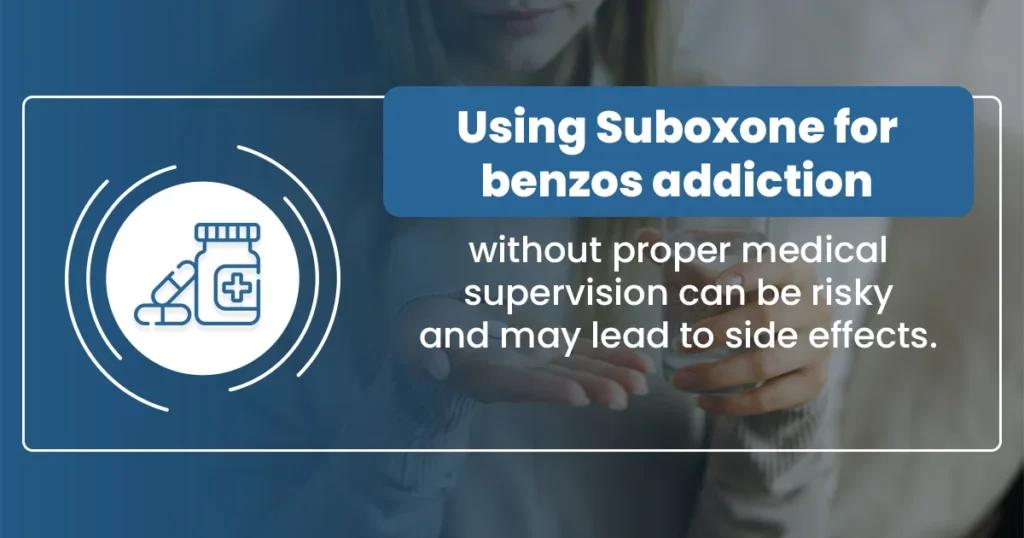Suboxone, a medication commonly used for opioid addiction treatment, has shown potential benefits in managing benzodiazepine (benzo) addiction. Suboxone, which contains buprenorphine and naloxone, can help ease withdrawal symptoms and reduce cravings in individuals struggling with benzo addiction.
Understanding the role of Suboxone in benzo addiction is vital for exploring comprehensive strategies to address substance use disorders effectively.
Key Takeaways
While Suboxone is effective in managing opioid dependence, its role in treating benzodiazepine addiction is limited. Here’s what the article covers:
- Suboxone is not typically used as a first-line treatment for benzos addiction, as its main indication is opioid dependence.
- Using Suboxone for benzos addiction without proper medical supervision can be risky and may lead to side effects.
- Combining Suboxone with other interventions may be more effective in addressing addiction to benzodiazepines.
Begin your path to a healthier life by calling The Haven Detox-Little Rock at (501) 271-3342 for information about the recovery process.

Suboxone: How It Works
Suboxone is a prescription medication comprising buprenorphine and naloxone. It is primarily used in the treatment of opioid use disorder. Buprenorphine, the primary active ingredient, partially activates these receptors. It helps to reduce cravings and severe withdrawal symptoms of substance use.
Buprenorphine is a partial opioid agonist, meaning it binds to the same receptors in the brain as opioids but with less intensity. This partial activation also has a ceiling effect, meaning that overdoses do not produce uniformly greater effects, reducing the significant overdose risk.
Naloxone, the other component, is added to Suboxone to prevent misuse. If someone tries to inject Suboxone, the naloxone causes withdrawal symptoms, discouraging such behavior. Suboxone is typically given as a sublingual film or tablet and is prescribed as part of a comprehensive treatment program.
Benzodiazepines: An Overview
Benzodiazepines, often referred to as benzos, are a class of psychoactive drugs. They are often prescribed for anxiety disorders, insomnia, and other conditions. Benzos and opioids are both central nervous system (CNS) depressants, but they act on different neurotransmitter systems.
Benzodiazepine use primarily enhances the effect of the neurotransmitter gamma-aminobutyric acid (GABA), while opioids primarily act on opioid receptors. Some well-known benzodiazepines include diazepam (Valium), alprazolam (Xanax), clonazepam (Klonopin), and lorazepam (Ativan).
Benzos can effectively treat certain medical conditions when used appropriately and for short periods. They also carry a high risk of tolerance, dependence, and addiction, especially with problematic use of benzodiazepines.
While Suboxone is effective in managing opioid dependence, its role in treating benzodiazepine addiction is limited.
Efficacy Of Suboxone For Opioid Addiction
Suboxone has been widely used in opioid addiction treatment due to its efficacy in reducing withdrawal symptoms. Its active ingredient, buprenorphine, helps manage cravings without producing the intense euphoria caused by full opioid agonists like heroin.
The other ingredient, naloxone, is there to stop misuse. Naloxone, added to deter misuse, precipitates withdrawal symptoms if Suboxone is injected, discouraging inappropriate use.
Efficacy Of Suboxone For Benzo Addiction
While Suboxone is beneficial in treating opioid addiction, its efficacy for abuse of benzos is not well-established. Benzodiazepines and opioids act on different neurotransmitter systems in the brain. Benzos primarily enhance the effect of the neurotransmitter GABA.
In contrast, Suboxone targets opioid receptors and is not specifically designed to address benzos dependence. However, in cases of polysubstance dependence, where patients struggle with both opioid and benzos addiction, Suboxone may be prescribed. Then, it addresses the opioid component while separate treatment is provided for benzodiazepine prescriptions.
Therefore, while Suboxone is a valuable tool in the treatment of opioid use disorder, it is not suitable for managing benzos addiction.
The Differences Between Benzo And Opioid Addiction
Benzodiazepine and opioid addictions are both serious conditions that impact the brain’s chemistry. But they do so through different mechanisms.
Unique Challenges Of Treating Benzo Addiction
Treating benzos addiction presents unique challenges primarily due to the life-threatening nature of withdrawal symptoms. Unlike opioid withdrawal symptoms, benzodiazepine withdrawal can include severe anxiety symptoms, seizures, and even death if not managed properly.
The acute withdrawal effects need a carefully monitored tapering schedule under medical supervision. Additionally, benzodiazepine prescription is often linked to underlying anxiety disorder or panic disorders.
The Intended Use Of Suboxone Treatment
Suboxone is a medication primarily intended for the treatment of opioid dependence and drug abuse. It combines buprenorphine treatment, a partial opioid agonist, with naloxone, an opioid antagonist. Suboxone can manage withdrawal symptoms effectively at higher doses while also discouraging misuse.
Suboxone is most effective when used as part of a medication-assisted treatment (MAT) program, which includes counseling and behavioral therapies. This holistic approach helps people stabilize their lives, reduce illicit opioid use, and work toward long-term recovery.
Remember, both addictions need proper treatment plans that address not only the physical dependency but also the psychological aspects of addiction.
Using Suboxone For Benzo Addiction
Suboxone has been explored as a potential treatment for benzodiazepine addiction, but its efficacy and safety remain debated.
Benefits Of Suboxone Use For Benzo Addiction
One of the main benefits of using Suboxone for benzodiazepine addiction is its effectiveness in reducing withdrawal symptoms. Suboxone can also help stabilize individuals, making it easier for them to engage in counseling and other forms of addiction treatment.
In cases of polysubstance abuse, Suboxone can help manage fatal opioid overdose, potentially reducing the overall drug burden on a person. Moreover, Suboxone offers a smoother tapering process compared to benzodiazepines themselves. In addition, Suboxone is typically administered in an outpatient setting, offering greater flexibility and accessibility compared to inpatient detoxification programs.
Potential Side Effects And Risks Of Suboxone
Alongside the benefits, there are significant risks to consider. The dangers include the potential for dependence on Suboxone itself and the greater risk of diversion or misuse. The risks are severe in individuals with a history of substance use disorder (SUD).
Benzodiazepines and opioids act on different neurotransmitter systems, so Suboxone does not address the specific mechanisms of benzos addiction. Furthermore, combining both substances can increase the risk of respiratory depression, sedation, and overdose death.
The Clinical Research Supporting Suboxone Use
While Suboxone is primarily used for opioid addiction, there is limited clinical research evaluating its effects on benzos addiction. However, some clinical research data suggest that Suboxone may have potential benefits for managing benzos withdrawal symptoms and reducing drug cravings in patients with polysubstance dependence.
For example, a study published in the American Journal of Psychiatry found that buprenorphine-naloxone (Suboxone) treatment was associated with reduced benzodiazepine use. It also reported improved treatment retention in patients with opioid and benzodiazepine dependence compared to those receiving methadone maintenance therapy.
Ultimately, further research and clinical trials are needed to clarify the role of Suboxone in the management of benzodiazepine addiction.
Alternative Treatments For Benzo Dependence
Alternative treatments are available for benzodiazepine addiction beyond conventional methods.
Benzodiazepine Tapering Protocols: One approach to treating benzo addiction is to taper off the drug under medical supervision gradually. While this method can be useful, it needs close monitoring and may be challenging due to the potential severity of withdrawal symptoms.
Anticonvulsants: Some anticonvulsant drugs, such as gabapentin or pregabalin, have been used to manage benzos withdrawal symptoms. These medications work by modulating neurotransmitter activity in the brain, reducing severe side effects.
Selective Serotonin Reuptake Inhibitors (SSRIs): SSRIs are used as antidepressants that can help alleviate symptoms of anxiety and depression, which often co-occur with benzo addiction. While they do not directly target benzo dependence, they may improve mood.
Other Antidepressants: Antidepressants, such as mirtazapine or trazodone, may be used to manage symptoms of insomnia or depression that can occur during benzos withdrawal. These medicines can help improve sleep quality and stabilize mood, which may facilitate recovery.
Remember, it’s important to note that the selection of an alternative medication for benzo addiction should be based on individual patient preferences.
Therapy And Lifestyle Changes
Therapy plays an important role in overcoming benzodiazepine addiction. Cognitive behavioral therapy (CBT) can help patients recognize and change negative thought patterns. Additionally, changing lifestyles, such as regular exercise, eating healthy food, and using stress management techniques, can support continuing recovery.
In addressing benzodiazepine addiction, considering alternative treatments beyond medication opens up the potential for complete recovery.
Frequently Asked Questions (FAQ)
The most common benzos withdrawal symptom is anxiety. When individuals abruptly stop taking benzodiazepines after prolonged use, their bodies can experience the rebound effects of opioids. This effect may lead to heightened anxiety levels that are often more intense than the original symptoms of benzos abuse.
This rebound anxiety can manifest as restlessness, agitation, and a general feeling of unease. Other notable withdrawal symptoms include insomnia, irritability, tremors, and, in severe cases, seizures. These symptoms occur because benzodiazepines affect the central nervous system, and sudden discontinuation disrupts the brain’s chemical balance. Therefore, medical guidance is vital when discontinuing benzodiazepines to manage withdrawal symptoms effectively and safely.
Suboxone, a medicine containing buprenorphine and naloxone, is primarily used to treat opioid addiction. Its effectiveness in treating benzodiazepine addiction is limited. It does not address the specific neurochemical pathways affected by benzodiazepines. Benzos addiction involves the GABAergic system, whereas Suboxone targets the opioid receptors.
Benzodiazepine physical dependence requires a different treatment, which involves a gradual tapering of the opioid drugs. Tapering permits the body to adjust slowly to low doses. Psychological support, such as cognitive behavioral therapy (CBT), is also important. It addresses the chronic pain caused by benzodiazepine prescription and developing coping strategies.
Benzodiazepines and Suboxone are generally not recommended to be used together due to the potential for adverse effects, including respiratory depression and increased sedation. Both medications depress the central nervous system. This dangerous combination can lead to excessive drowsiness, confusion, respiratory distress, coma, or even death.
However, in certain cases where a patient has both opioid and benzodiazepine dependencies, healthcare providers may cautiously manage the use of Suboxone while closely monitoring the patient for serious side effects. In such situations, the doctors must assess the medical history and individual circumstances to develop a better treatment plan.
Recovery Begins At The Haven Detox-Little Rock
Are you or a loved one struggling with addiction and facing barriers? At The Haven Detox-Little Rock, we offer holistic support to individuals seeking recovery from addiction.
We provide residential treatment services, offering a supportive environment for individuals struggling with substance abuse. Our medical detox program ensures safe withdrawal from substances, supported by medical supervision. In addition, IV therapy delivers essential nutrients and medications directly into the bloodstream, promoting faster recovery.Don’t let addiction hold you back. Dial (501) 271-3342 to contact our experienced team and start your path to a brighter, sober life.




